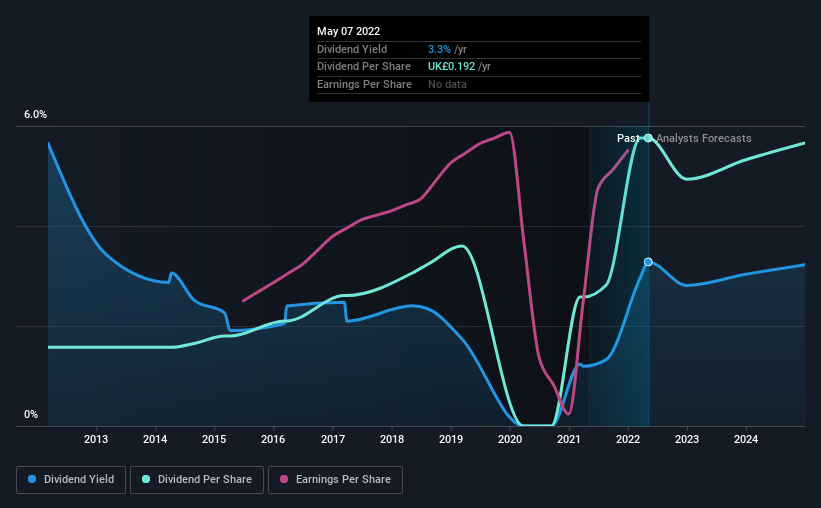
Marshalls plc's (LON:MSLH) dividend will be increasing to UK£0.096 on 1st of July. This takes the annual payment to 2.4% of the current stock price, which unfortunately is below what the industry is paying.
Check out our latest analysis for Marshalls
Marshalls' Earnings Easily Cover the Distributions
If it is predictable over a long period, even low dividend yields can be attractive. The last payment was quite easily covered by earnings, but it made up 110% of cash flows. The company might be more focused on returning cash to shareholders, but paying out this much of its cash flow could expose the dividend to being cut in the future.
Over the next year, EPS is forecast to expand by 17.9%. If the dividend continues on this path, the payout ratio could be 56% by next year, which we think can be pretty sustainable going forward.

Dividend Volatility
The company's dividend history has been marked by instability, with at least 1 cut in the last 10 years. Since 2012, the first annual payment was UK£0.052, compared to the most recent full-year payment of UK£0.19. This means that it has been growing its distributions at 14% per annum over that time. It is great to see strong growth in the dividend payments, but cuts are concerning as it may indicate the payout policy is too ambitious.
The Dividend's Growth Prospects Are Limited
Given that the dividend has been cut in the past, we need to check if earnings are growing and if that might lead to stronger dividends in the future. Earnings per share has been crawling upwards at 2.8% per year. The company has been growing at a pretty soft 2.8% per annum, and is paying out quite a lot of its earnings to shareholders. While this isn't necessarily a negative, it definitely signals that dividend growth could be constrained in the future unless earnings start to pick up again.
The company has also been raising capital by issuing stock equal to 27% of shares outstanding in the last 12 months. Regularly doing this can be detrimental - it's hard to grow dividends per share when new shares are regularly being created.
Our Thoughts On Marshalls' Dividend
Overall, we always like to see the dividend being raised, but we don't think Marshalls will make a great income stock. While the low payout ratio is redeeming feature, this is offset by the minimal cash to cover the payments. Overall, we don't think this company has the makings of a good income stock.
Market movements attest to how highly valued a consistent dividend policy is compared to one which is more unpredictable. Meanwhile, despite the importance of dividend payments, they are not the only factors our readers should know when assessing a company. As an example, we've identified 2 warning signs for Marshalls that you should be aware of before investing. Is Marshalls not quite the opportunity you were looking for? Why not check out our selection of top dividend stocks.
New: Manage All Your Stock Portfolios in One Place
We've created the ultimate portfolio companion for stock investors, and it's free.
• Connect an unlimited number of Portfolios and see your total in one currency
• Be alerted to new Warning Signs or Risks via email or mobile
• Track the Fair Value of your stocks
Have feedback on this article? Concerned about the content? Get in touch with us directly. Alternatively, email editorial-team (at) simplywallst.com.
This article by Simply Wall St is general in nature. We provide commentary based on historical data and analyst forecasts only using an unbiased methodology and our articles are not intended to be financial advice. It does not constitute a recommendation to buy or sell any stock, and does not take account of your objectives, or your financial situation. We aim to bring you long-term focused analysis driven by fundamental data. Note that our analysis may not factor in the latest price-sensitive company announcements or qualitative material. Simply Wall St has no position in any stocks mentioned.
About LSE:MSLH
Marshalls
Manufactures and sells landscape, building, and roofing products in the United Kingdom and internationally.
Excellent balance sheet with proven track record and pays a dividend.


